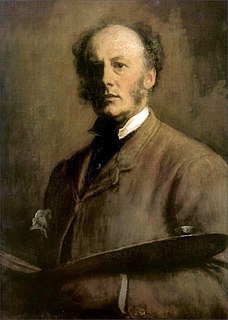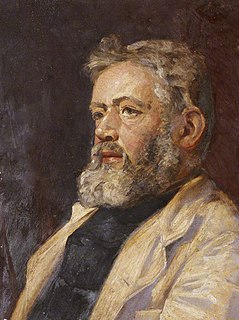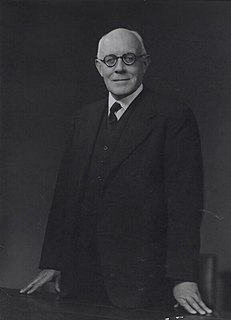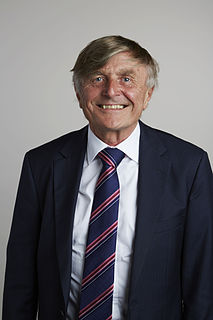Related Research Articles

Sir John Everett Millais, 1st Baronet, was an English painter and illustrator who was one of the founders of the Pre-Raphaelite Brotherhood. He was a child prodigy who, aged eleven, became the youngest student to enter the Royal Academy Schools. The Pre-Raphaelite Brotherhood was founded at his family home in London, at 83 Gower Street. Millais became the most famous exponent of the style, his painting Christ in the House of His Parents (1849–50) generating considerable controversy, and he produced a picture that could serve as the embodiment of the historical and naturalist focus of the group, Ophelia, in 1851–52.

Sir Jonathan Pryce is a Welsh actor who is known for his performances on stage and in film and television. After studying at the Royal Academy of Dramatic Art, he began his career as a stage actor in the early 1970s. His work in theatre includes an Olivier Award-winning performance in the title role of the Royal Court Theatre's Hamlet in 1980 and as The Engineer in the stage musical Miss Saigon in 1990. On the Broadway stage he earned Tony Awards—the first for Best Featured Actor in a Play for his Broadway debut role in Comedians (1977), the second for Best Actor in a Musical for the Broadway transfer of the musical Miss Saigon (1991).
Sir Lionel Alexander Bethune Pilkington, known as Sir Alastair Pilkington, was a British engineer and businessman who invented and perfected the float glass process for commercial manufacturing of plate glass.

John Campbell Arbuthnott, 16th Viscount of Arbuthnott, was a Scottish peer, Lord Lieutenant of Kincardineshire (1977–99) and a notable businessman.
John Northcote Nash was a British painter of landscapes and still-lives, and a wood engraver and illustrator, particularly of botanic works. He was the younger brother of the artist Paul Nash.
Nicholas Crane is an English geographer, explorer, writer and broadcaster. Since 2004 he has written and presented four television series for BBC Two: Coast, Great British Journeys, Map Man and Town.

William Gershom Collingwood was an English author, artist, antiquary and professor of Fine Arts at University College, Reading. A long-term resident of Coniston, Cumbria, he was President of the Cumberland and Westmorland Antiquarian Society and the Lake Artists' Society.

Auckland Campbell Geddes, 1st Baron Geddes, was a British academic, soldier, politician and diplomat. He was a member of David Lloyd George's coalition government during the First World War and also served as Ambassador to the United States.
John William Deathridge is a British musicologist. He was educated at King Edward's School, Birmingham, and at Lincoln College, Oxford culminating with a dissertation on Wagner's sketches for Rienzi, and is currently Emeritus Professor of Music at King's College London. Deathridge lives in Cambridge.
David Selbourne is a British political philosopher, social commentator and historian of ideas. He was educated at Manchester Grammar School, and Balliol College, Oxford, where he studied Jurisprudence, held the Winter Williams Law Scholarship, and was awarded a Paton Studentship and the Jenkins Law Prize. He was thereafter a British Commonwealth Fellow at the University of Chicago Law School, and in 1960 was called to the bar of the Inner Temple where he was student scholar, but did not practise law. He is the father of Raphael Selbourne, winner of the 2009 Costa First Book Award.

Henry Cohen, 1st Baron Cohen of Birkenhead was a British physician, doctor and lecturer. He was famous for his Harveian Oration at the Royal College of Physicians in 1970, on the motion of blood in the veins. Cohen was elected to the chair of medicine at the University of Liverpool in 1934. When the Central Health Services Council was formed in 1949, he became its vice-chairman, and chairman in 1957. Knighted in 1949, he was President of the British Medical Association from 1951. After a coronary thrombosis in the following year, Cohen decided to devote his life to the greater work of teaching. He was raised to the peerage as Baron Cohen of Birkenhead, of Birkenhead in the County Palatine of Chester, on 16 June 1956 and was elected President of the General Medical Council in 1961. In 1964, he became President of the Royal Society of Medicine, receiving the society's gold medal in 1971. He also opened the assembly hall of the King David School, Liverpool.

Sir Robin Keith Saxby FREng HonFRS is an English engineer who was chief executive and then chairman of ARM Holdings, which he built to become a dominant supplier of embedded systems.

Prof John George Adami was an English pathologist. He was the head of the pathological department of the Royal Victoria Hospital. From 1892, he was professor of pathology in McGill University, Montreal, Canada. During World War I, he was accorded a temporary commission in the Canadian Army Medical Corps to serve as the official historian for the medical branch. Starting in 1919, he was the Vice-Chancellor of the University of Liverpool.

Leonard Campbell Taylor was a British painter, mainly of portraits and interiors in a traditional style. Among his patrons was the founding family of Courtaulds and the Courtauld Institute of Art. He was a member of the Royal Academy.
Bernard Francisco Ribeiro, Baron Ribeiro, CBE, FRCS is a British surgeon who served as President of the Royal College of Surgeons of England from 2005 to 2008. He was created a life peer in 2010 and sits in the House of Lords on the Conservative benches.
Sir William John Pugh was a British geologist who was director of the Geological Survey of Great Britain and of the Museum of Practical Geology, Department of Scientific and Industrial Research.

James Thomas Brownlie was a British trade unionist and politician.
Professor Michael Francis Oliver CBE, FRCP, FRSE (1925–2015) was a 20th-century British cardiologist who served as President of the Royal College of Physicians of Edinburgh for the period 1985 to 1988. He made major advances in identifying the causes of heart disease.
Colin Graham Frederick Hayes was a British artist who worked in both oils and watercolours and who, through his teaching and his books, influenced several highly renowned younger artists.

Mary Hannah Frances Ivens CBE FRCOG was an obstetrician and gynaecologist who was the first woman appointed to a hospital consultant post in Liverpool. During the First World War she was chief medical officer at the Scottish Women's Hospital at Royaumont, northeast of Paris. For her services to the French forces she was awarded the Légion d'honneur and the Croix de Guerre.